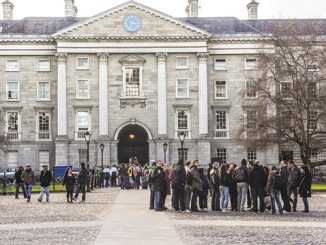
[dropcap][/dropcap]Since the Erasmus programme was established in 1987 it has been the foundation for international friendships, job opportunities and even marriages. The programme has had its fair share of difficulties since the word ‘Covid-19’ first crept into everyday conversation. Yet, interest in the programme has never faltered.
The values of the programme are more important in 2021 than ever before. As nations, communities and individuals we have struggled to understand a year of constant bad news bulletins. The Erasmus programme promotes unity and understanding between countries, something that is more important than ever as we slowly work towards the light at the end of what was once a never-ending tunnel. Difficulties within international travel, recurring lockdowns and government health restrictions in foreign languages have not deferred young people from exploring cultures that are different than their own and making friends for life. There has always been strength in numbers. Times of crisis and panic, constantly prove that statement to be true.
Shanone Kurca-Lopes is a proud former Erasmus student. The French woman’s experience abroad, opened up a world of opportunities eventually leading her to become the Internship Coordinator for the United Nations in The Hague. “I think Erasmus is important for promoting understanding between countries and to discover new cultures”, the former ESN Rennes (Erasmus Student Network) president explains.
“It promotes a different way of understanding things.”
For Ellie Herr, a University of Liverpool student – an Erasmus year meant chatting to people she never would have met at home. “It forced me to interact and make friends with people I would have never met or mixed with at home, which I’m really grateful for.”
The importance of travel
Travel has always promoted understanding, the ability to realise that the similarities between countries far outweigh the difficulties. Gabrielle Oehlmann’s exchange programme (like the Erasmus programme within the EU), allowed her to travel to the other side of the world. The proud Sydney native believes moving to a country 15,150 km away from her family, was an opportunity too valuable to turn down. “I think it’s really important to open yourself up to different cultures and life experiences that differ to your own.
Understanding other people’s cultures and histories is so important all the time, but especially in times of hardship. It’s sadly so common for people to generalise cultures and be very prejudiced.” Oehlmann points toward the racism towards people from China at the beginning of the pandemic as an example. “If everybody learned that we’re all not that different to each other, things would be much nicer. I think cultural understanding is what breeds empathy.”
Britain’s exit from Erasmus
Former Erasmus students from the United Kingdom, count themselves as extremely lucky to have been able to join the Erasmus family. “It made the world smaller, and probably taught me that humour is universal”, Ellen Denton reflects. The Turing programme (named after the famous Mathematician Alan Turing) is set to enable UK students to study in other countries. Yet, Denton feels the community aspect of the Erasmus programme has a large part to play in its success. “I am so glad I did it before Brexit. Firstly, because of the visas but also because I felt like a European citizen more than ever on Erasmus and I think Brexit stops that. It makes you very much British over European.”
The University of Liverpool student feels she didn’t just learn about French culture during her time abroad. The programme allowed her to see the things she had been taught from an early age, from another person’s perspective. This is a sentiment echoed by Erasmus students across the continent. “I learned so much about Ireland and Irish culture. My friends were shocked at how little we were taught about Ireland. I was shocked and embarrassed. Some people I know don’t even know Ireland has its own language,” she finishes.
Tyrone born Janine Ferry, explains that her Erasmus year allowed her to recognise some of the privileges we take for granted. “My time on Erasmus taught me more about my personality than any experience ever could. It made me realise just how reliant in I am on my ability to chat to people and have a laugh.” The bubbly 24-year-old found herself sitting silent in a kitchen full of people for the first time in her lifetime.
The Erasmus programme allows many to see the world through the eyes of another, an invaluable experience at any stage of life. “Another thing I gained from my Erasmus year is a new appreciation for people who move to the UK or Ireland to work. Before Erasmus, I had never considered just how difficult it must be to move to a new country to live and work there”, admits Ferry. “I believe Erasmus plays a vital role in uniting people because it puts everyone in the same boat.”
She was saddened to hear that the UK had left the Erasmus programme. “Now more than ever, it is important to encourage UK students to maintain the present links with other EU countries. Not only for selfish reasons like employability but also on a human level.” Ferry is now surrounded by friends in countries across Europe. “Having friends from other countries gives you the chance to compare approaches and attitudes. You can decide whether the way ‘things are done’ in your own home country are right or if they could be improved.”
A different perspective
Most of the opinions we have as teenagers are greatly influenced by the ones held by our parents or teachers. We are shaped by our communities and backgrounds. When you travel to a foreign country, you can see the place you call home through the eyes of an outsider. This was particularly poignant to Ferry, as a young person from Northern Ireland. “When you go on Erasmus, you are forced to self –reflect. You also reflect on where you come from when you’re meeting new people and explaining your background to them. This was poignant for me when I met people from Ireland and we discussed a bit of Northern Ireland’s turbulent story so far.”
Being able to have these conversations in a casual setting was a defining moment for Ferry. “It was so good to have the opportunity to discuss points of view rather than reading a few biased articles online. Hearing other people’s perspective and how things were taught to them in their country is a crazy experience because it makes you realise that perhaps not everything you’ve been told over the years is the whole truth.”
Box rooms and hotel quarantines
The Erasmus programme has had its fair share of problems in the past year. The students are still as determined as ever to study in another European university is a testament to the programme and its values. ESN Ireland President, Mark McGee has seen first-hand the obstacles that Erasmus students have faced this year. McGee believes Ireland may well see an influx of incoming Erasmus students, as one of the main English speaking countries after Brexit.
“This causes problems for ourselves in Ireland. We need to be prepared for this whether that’s preparing our universities for an influx of students, bigger class sizes or support for international and Erasmus students.”
Covid-19 has brought to light a series of issues, with many Erasmus students in Ireland this year spending most of their time within their student accommodation. “Students usually come and stay in little box rooms, or have three people in a room sharing. I think something needs to be done about this to provide a better quality of life while these students are on exchange. It’s quite important to show that we care about the students coming in.”
Accommodation has been a contentious issue for Irish students coming home from abroad recently. Rachel Hurley booked a flight home to avoid the mandatory hotel quarantine. This was before she learned that the state would help to cover the 1,875-euro fee for returning students. “We were already so horribly stressed and panicked, trying to book everything and pack up in a short time”, explains the UCC student. “We just felt safer and more at ease getting home while we could.”
It might be easy to assume that the worry of getting home mixed with exam stress, would make Hurley regret her decision to study abroad this year. This is far from the case. She admits her experience may not be the same one students have had in the past. However, the memories made and the friendships forged far outweigh the negatives. “I’m so happy I went! Even with Covid and having to pay for tests to travel, I’d still recommend it to anyone who’s doubting whether they should go in September or not.”
The core values held by the Erasmus Student Network continue to resonate clearly in a world of uncertainty.
“Unity in diversity, diversity in the unity.”
We all have different backgrounds, but every one of us is working towards a common goal.
Róisín Cullen
Image Credit: WikiMedia



